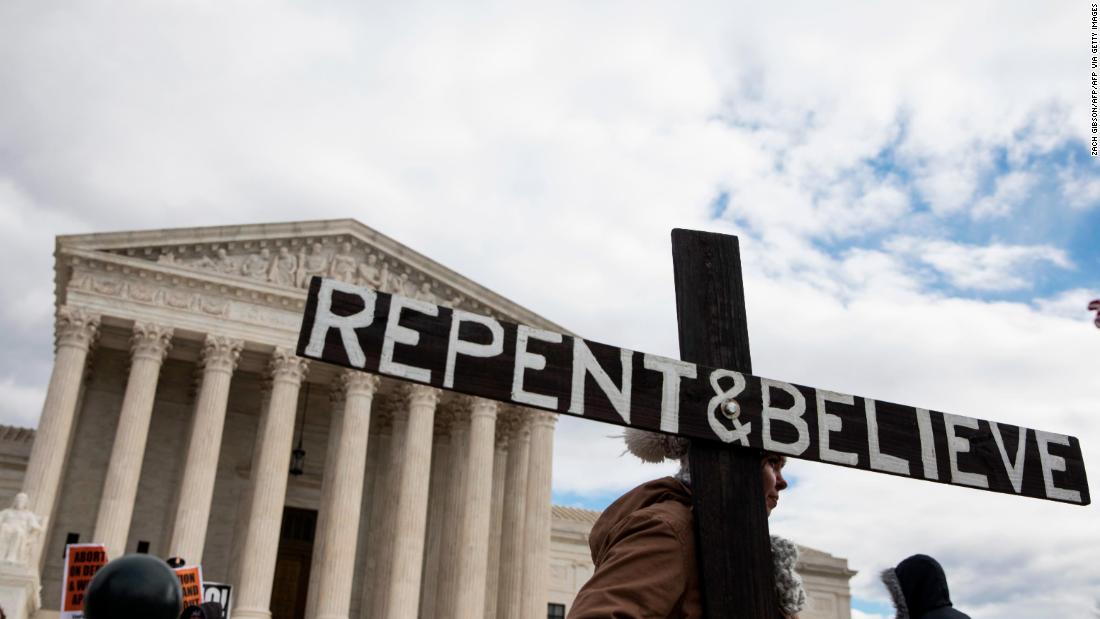
www.cnn.com
How the Supreme Court recalibrated the abortion debate in just 3 words
It's not just that US Supreme Court majorities upheld Mississippi's 15-week abortion ban and overturned Roe v. Wade. The opinion also skewed the crux of the conversation going forward -- with just three words.
Politics
(CNN)It's not just that US Supreme Court majorities upheld Mississippi's 15-week abortion ban and overturned Roe v. Wade. The opinion also skewed the crux of the conversation going forward -- with just three words.
"Unborn human being" is the term Associate Justice Samuel Alito adopted from the Mississippi statute, thereby replacing the key phrase in the landmark 1973 Roe ruling that spelled out a constitutional right to abortion: "potential life."
It may seem like a semantic argument. Experts say it's anything but.
Alito didn't write God or Christianity or Bible anywhere in the opinion, but his justification is a veiled "religious narrative," said Rebecca Todd Peters, a religious studies professor at Elon University. By co-opting the language in Mississippi's law in Dobbs v. Jackson Women's Health Organization, the majority opinion gives credence to the notion -- embraced largely by the religious right -- that life begins at fertilization, she said. The ruling has already emboldened several states to ban and criminalize the medical procedure in almost all circumstances.
"That is an enormous shift," Peters said. "It erases whole groups of people who have different religious beliefs."
Peters, who is ordained in the Presbyterian Church, isn't merely speaking about Christians. When a zygote, embryo or fetus becomes a human being is far from an objective determination within or across any religions. There is no scientific gauge: Doctors tend to focus on viability, which experts believe to be around 23 weeks, though health outcomes improve the longer the gestational period. Various religions have relied on a range of wayposts, including fertilization, quickening (when the mother feels the fetus moving), when the embryo develops a heartbeat, ensoulment and birth.
Confounding matters is that, just like in Christian sects, there are chasms of disagreement among other religions -- not only regarding personhood but also a woman's bodily autonomy -- making holy texts a troublesome barometer for whether abortion should be outlawed. Worse, said Peters, is that by co-opting the term, "unborn human being," it signals "which religious voices get authority and power in our country."
Though opponents of legalized abortion often paint women who undergo abortions as heathens, a strong majority -- more than 6 in 10 -- identified as women of faith in a 2014 poll, said Peters, who is on sabbatical for a research project titled, "Abortion and Religion: Listening to Women."
"There are a whole lot more who support bodily autonomy for mothers to make decisions about life and how many children they have and who they have them with and how to shape their future with or without partners," Peters said. "We've allowed a minority religious belief to curtail the rights of the majority of women in the country. I feel like I'm in the middle of a dystopian novel."
More than 50 religious groups sought to make this clear to the high court last year, filing a friend-of-the-court brief explaining religious traditions have various views of when life begins, affirm a woman's "moral right" to decide when to terminate pregnancy and stand by "the importance of ensuring reproductive choice for women in marginalized communities who are disproportionately harmed by the ban."
"By prohibiting abortions beyond 15 weeks gestation, the Ban precludes women from making that choice in accordance with their own moral, spiritual, and religious beliefs, which this Court has recognized as a constitutional right," the brief said.
The attitude that a woman would have to justify her decision to others is "rooted in religion," Peters said. It robs women of their autonomy and espouses a narrow, archaic view of Christianity that has long been malappropriated to dictate "women are to be subservient and meant to be child bearers," she said.
























































